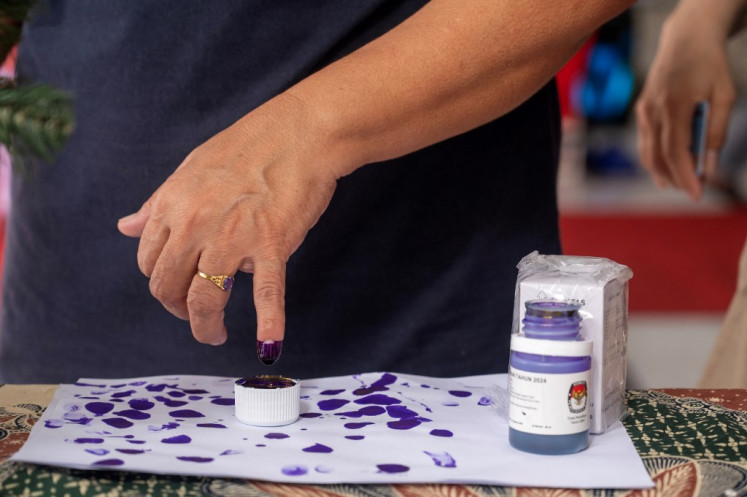Popular Reads
Top Results
Can't find what you're looking for?
View all search resultsPopular Reads
Top Results
Can't find what you're looking for?
View all search resultsNuraini Juliastuti: The bold intellectual
JP/Prodita SabariniWhen Nuraini Juliastuti was an undergraduate student at Gadjah Mada University (UGM), she made a bold move with fellow UGM student Antariksa and founded the country’s first cultural studies center, which they called Kunci
Change text size
Gift Premium Articles
to Anyone
JP/Prodita Sabarini
When Nuraini Juliastuti was an undergraduate student at Gadjah Mada University (UGM), she made a bold move with fellow UGM student Antariksa and founded the country’s first cultural studies center, which they called Kunci.
It was 1999, a year after the toppling of Soeharto and Nuraini said that they were eager to create and produce something new. Both Nuraini and Antariksa, who were involved in the student protests that toppled Soeharto, sought to take advantage of the new era that lay before them. They were also involved in UGM’s university press Bulak Sumur, which had an interest in pop culture and the media.
They read and studied on their own about cultural studies, which at that time was gaining ground in Indonesia in part due to articles by Kompas writer Bre Redana and books by international thinkers.
“We were actually very brave to call ourselves the Kunci cultural studies center. We were so young,” she said. People doubted us and treated us as if to say: “Who do you think you are?”
“But it didn’t hurt our feelings. Our main purpose was to open up a discussion about it.”
Nuraini, 35, who is known as Nuning among her friends, was in Jakarta last week for a seminar on civic space at the University of Indonesia. We talked in a coffee shop in one of Jakarta’s mall.
Kunci published newsletters, launched a website and a mailing list. They also had monthly discussions with local and international social scientists.
“We really didn’t think about it that much. We just plodded on. Maybe we were too confident, we didn’t make a fuss,” she said. “One thing is though that we never had doubts. We just carried on.”
She said Kunci grew while developing an increasing interest in media studies. At that time, universities were starting to introduce the subject in their curricula. Kunci’s Internet mailing list became a popular site for discussions and now has nearly 2,000 members.
Now Kunci has an established office and is carrying out research on media and technology convergence. It is the only cultural studies center outside of the university, a position Nuraini and Antariksa took to oppose the university’s strong hold over knowledge.
She said Kunci had the advantage of having more spare time than researchers in universities. “A lot of people wanted to create something like Kunci in universities, but they are very busy. Universities are very bureaucratic so they don’t have the time. Our position outside universities makes us able to conduct different experiments.”
Initially, Nuning and Antariksa financed Kunci themselves. Idealistic and young, Nuning never thought about money or the anxiety shared by all young university students about graduating and entering the working world.
“I rarely thought about money,” she said. “It had to do with 98. We were in the university newspaper. We both saw the New Order collapse,” she said. “We had to create something. The moment was right. We had to be certain of our interest and after 98 we made something based on what we liked doing. And we started to create newsletters.”
She said her time spent with people at the university during discussions and trips to other cities had helped her develop intellectually.
She said students nowadays might not have the luxury of exploring their thoughts and passions as freely as her generation. In her time, she said, most students completed their undergraduate degree in six or seven years during which they would be involved in various activities outside of the class room.
“Now at UGM, students have to complete their studies in four years or face having to drop out.”
Instead of finding a steady job after completing her undergraduate studies, Nuning continued to run Kunci and worked as a freelance writer. Nuning said she had developed an interest for writing when she was in junior high school.
In her hometown, the local newspaper, Surabaya Pos, runs a youth section every Wednesday. Nuning contributes for the newspaper every week. “I think [when I started writing for] that newspaper, it was a milestone in my life,” she said.
Nuning said she had tried lecturing but found it too time consuming. “Maybe I am selfish but it takes a lot of time working as a lecturer. You have to prepare the materials, read books, serve the students.”
“I felt that I’d rather spend my time reading and writing. So, [lecturing was a job that I didn’t really like.”
Her contributions for Kunci, however, made up for her lack of interest in teaching.
She said Kunci’s aim was to produce and spread knowledge. The challenge is to implement discussion in public discourse, she said. “How do we turn it into action?” she said.
Nuning said Kunci held activities including discussions and workshops for the public. “I think it’s still not enough. This is just a set of experiments.”










